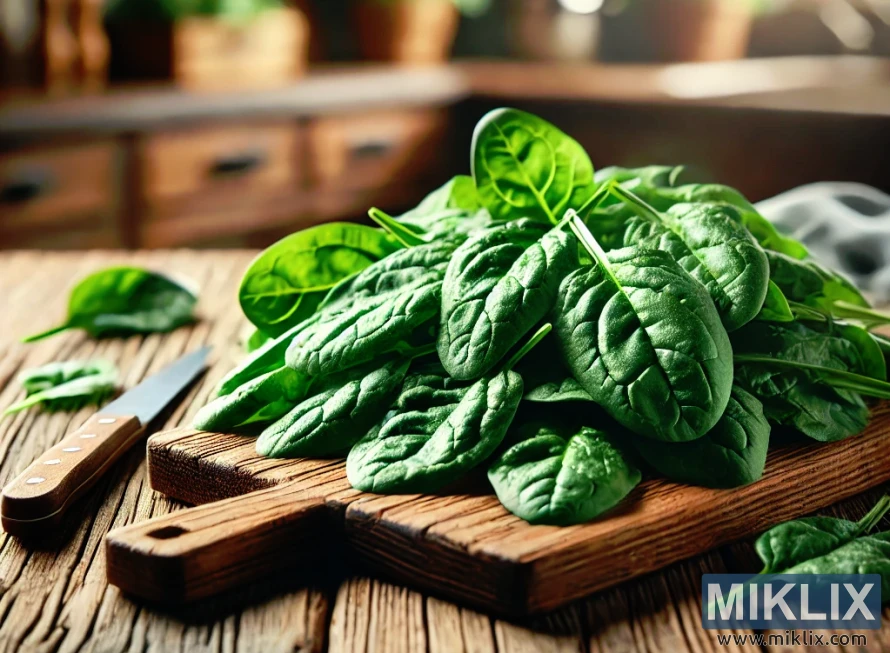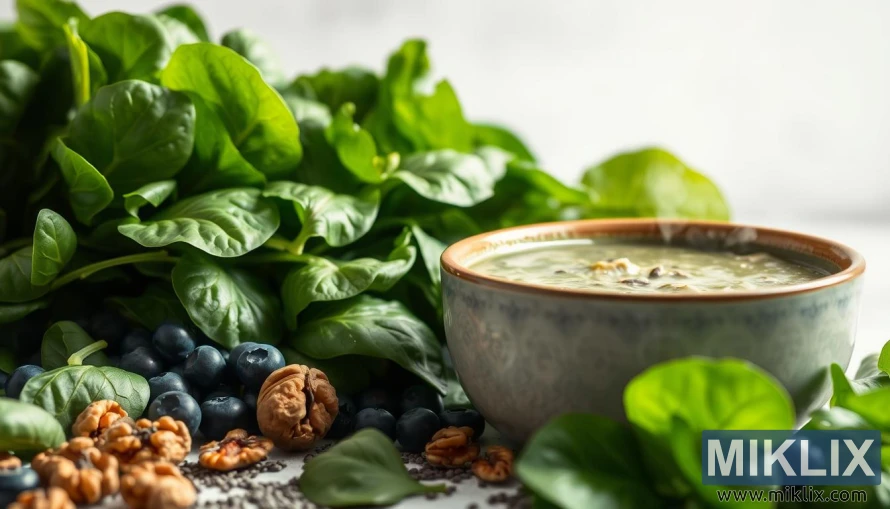Stronger with Spinach: Why This Green is a Nutritional Superstar
Published: March 26, 2025 at 6:14:03 PM UTC
Last updated: March 28, 2025 at 3:17:34 PM UTC
Spinach is a versatile and nutritious ingredient that fits well into a healthy lifestyle. It's packed with vitamins, minerals, and antioxidants. Adding spinach to your diet is a simple way to boost your health. Spinach is low in calories but high in fiber. This makes it great for weight management and digestive health. Regularly including spinach in your meals can lead to many health benefits.
Spinach has come a long way from being a cartoon character's favorite to a modern superfood. It's packed with vitamins, minerals, and antioxidants. A single cup of spinach gives you 100% of your daily vitamin K and only 7 calories.
Spinach is a powerhouse in small servings. A half-cup of cooked spinach is full of iron, fiber, and antioxidants like lutein. Raw spinach keeps its vitamin C. You can add it to smoothies or sauté it to boost your health.
Key Takeaways
- Spinach provides 100% of daily vitamin K in just one cup.
- Rich in iron and antioxidants like lutein for eye and heart health.
- Low-calorie spinach nutrition (7 calories per cup) aids weight-conscious diets.
- Supports for bone, immune, and cardiovascular health through vitamins and minerals.
- Easy to incorporate into meals to maximize spinach benefits daily.
Introduction to Spinach: A Nutritional Powerhouse
Spinach is known as a superfood because of its high nutritional value. It's full of vitamins, minerals, and antioxidants. Each bite brings health benefits.
A 100-gram serving has only 23 calories. This makes it a low-calorie food.
- 7 calories per cup (30g cooked)
- High amounts of vitamin A and vitamin K
- Key antioxidants like lutein and quercetin
- Iron content to combat anemia
Spinach has been used for centuries in Mediterranean and Asian cooking. It became famous for fighting diseases. Its fiber helps with digestion, and nitrates boost blood flow.
Whether it's fresh or frozen, spinach is a must-have in the kitchen. Keep it in the fridge for up to a week to keep it fresh.
Nutritional Profile of Spinach
Spinach is packed with vitamins and minerals, making it a superfood. One cup of raw spinach gives all the vitamin K you need for the day. It also contains significant amounts of vitamin A, vitamin C, and iron.
These nutrients help boost your immunity, energy, and how your cells work.
- Spinach vitamins: Vitamin K, A, C, folate, and B6 support immunity, vision, and blood function.
- Spinach minerals: Iron, magnesium, and manganese aid oxygen transport, nerve function, and metabolism.
- Spinach antioxidants: Lutein, quercetin, and zeaxanthin combat oxidative damage linked to chronic diseases.
Spinach is full of nutrients, but it has oxalate that can limit calcium absorption. Eating it with foods high in vitamin C can help iron absorption. With only 23 calories per 100 grams and 91% water, it's a low-calorie way to boost your nutrition. Whether you eat it raw in salads or lightly cooked, spinach gives you these essential nutrients without extra fats or sugars.
Spinach for Heart Health: Protecting Your Cardiovascular System
Spinach is great for heart health because of its potassium. 100g has almost 600 milligrams of potassium. This helps balance sodium and relaxes blood vessels.
Potassium is key in managing blood pressure. It eases the heart's workload. Eating spinach regularly can lower the risk of high blood pressure.
Spinach's nitrates turn into nitric oxide in our bodies. This widens blood vessels and improves blood flow. A study showed drinking spinach-based drinks can lower blood pressure for up to five hours.
These effects help protect arteries and reduce heart strain.
- Potassium-rich spinach helps counter sodium’s impact, lowering blood pressure spikes.
- Nitric oxide from spinach nitrates boosts blood flow and eases vascular tension.
- Vitamin K in spinach supports heart structure by reducing left ventricular hypertrophy (LVH) risks linked to low intake.
Spinach also has magnesium and folate for cholesterol control. Fiber binds to fats that clog arteries. Antioxidants fight oxidative stress that harms heart tissues.
A study of 766 teens found low vitamin K increased LVH risks. This shows spinach's importance for heart muscle health.
Add spinach to your daily meals for heart benefits. Use it in smoothies, salads, or sautés. Small changes today can make a big difference for your heart tomorrow.
Eye Health Benefits: Lutein, Zeaxanthin and Vision Protection
Spinach is great for your eyes because of its lutein and zeaxanthin. These antioxidants protect your eyes from harmful blue light and reduce stress. Eating half a cup of spinach daily for two months can increase lutein levels, helping protect your vision.
A 2020 study found spinach and kale consumption increased macular pigment density by 4–5% in four weeks, aiding AMD protection.
Spinach's lutein and zeaxanthin help strengthen the macula, the part of your eye that sees clearly. Spinach has more lutein than most vegetables. To get the most out of these nutrients, eat spinach with fats like avocado or olive oil.
- Eat spinach salads with olive oil to maximize lutein absorption.
- Add spinach to smoothies bowls with nuts for enhanced zeaxanthin uptake.
- Combine spinach with eggs—egg yolks contain lutein and zeaxanthin, boosting eye health.
To fight AMD, aim for to get enough lutein and zeaxanthin every day. AMD is a big cause of blindness worldwide, according to the WHO. Make sure to include spinach in your meals to keep your eyes healthy.
Spinach and Cancer Prevention
Spinach is packed with chlorophyll and antioxidants, which help fight cancer. Studies show these nutrients can slow down tumor growth and protect cells. For example, a Texas A&M University study found that freeze-dried spinach reduced polyp formation in rats prone to colon cancer.
Over 26 weeks, the spinach diet changed the rats' gut microbiome. This led to an increase in beneficial metabolites that help control inflammation.
- Spinach antioxidants cancer-fighting effects include fatty acids and linoleic acid derivatives, which studies suggest inhibit tumor development.
- Eating spinach regularly may cut colon cancer risk by up to 50%, per population studies tracking over 70,000 participants.
- Spinach’s anti-cancer benefits also involve MGDG, a compound that slows cancer cell growth in lab tests.
Colon cancer is the fourth most common cancer in the U.S. It affects 1 in 3 people at some point. The American Cancer Society recommends starting screenings at age 45.
While spinach chlorophyll’s role is being studied, its nutrients help lower cancer risk. Adding spinach to meals can reduce bowel cancer risk by 9-11%. This is thanks to higher folate intake.
Bone Strength and Health: Vitamin K and Calcium in Spinach
Spinach is packed with vitamin K and calcium, two nutrients vital for bone health. A single cup of spinach gives you all the daily vitamin K you need. This vitamin helps bind calcium to bones, making them stronger and reducing the risk of fractures.
Spinach also has 30 mg of calcium per cup. But, its oxalates can make it hard for your body to absorb this calcium.
Vitamin K in spinach is key for bone health. Research shows it can lower the risk of fractures by strengthening bone proteins. A cup of spinach gives you vitamin K, helping keep calcium in your bones instead of losing it in urine.
This vitamin works with magnesium and antioxidants in spinach to protect bones from damage.
But, spinach's calcium is hard to get because of oxalates. Cooking spinach can help reduce oxalate levels, making calcium more available. Adding vitamin D-rich foods like fortified milk or sunlight exposure can also help your body use calcium better.
Experts suggest eating spinach with foods low in oxalates, like almonds or broccoli, for better bone support.
- Cook spinach to reduce oxalate content before eating.
- Combine with vitamin D-rich foods to enhance calcium use.
- Balance spinach intake with other bone-friendly foods like yogurt or fortified plant milk.
While spinach is good for bones, its calcium isn't fully absorbed. It's best to eat spinach with calcium from dairy, fortified foods, or supplements. Drinking plenty of water helps flush out excess oxalates, reducing the risk of kidney stones.
By making small changes, like these, spinach can become a valuable part of a diet that supports strong bones.
Anti-Inflammatory Properties of Spinach
Spinach has special compounds like lutein, quercetin, and nitrates. These spinach antioxidants fight free radicals and stop inflammation signals. Eating spinach regularly can help lower inflammation linked to chronic diseases.
- Quercetin: inhibits enzymes like COX-2 to lower inflammation.
- Zeaxanthin: reduces oxidative damage in joints and blood vessels.
- Nitrates: improve blood flow while calming inflammatory responses.
Spinach helps lower inflammation by reducing cytokines production. Studies show its beta-ecdysone lowers pro-inflammatory molecules, easing joint pain and cardiovascular strain. The fiber and antioxidants in spinach also support gut health, further limiting systemic inflammation.
Add spinach to your daily meals to enjoy its anti-inflammatory benefits. Pair it with healthy fats like olive oil to boost nutrient absorption. Small changes like adding spinach to meals can help manage inflammation and support long-term health.
Brain Health and Cognitive Benefits
Spinach is good for your brain, and science agrees. A study followed 960 older adults. Those who ate half a cup of cooked spinach a day kept their memory sharp. It was like they were 11 years younger.
Spinach's nutrients like vitamin K, lutein, and folate protect brain cells. They also reduce inflammation. This is why spinach is so beneficial for your brain.
Spinach has antioxidants that protect brain cells. Folate helps make neurotransmitters, and lutein improves memory. These nutrients slow down cognitive decline, keeping the brain healthy.
- Phylloquinone (vitamin K) strengthens neural pathways.
- Lutein improves memory retention and focus.
- Folate reduces age-related brain shrinkage.
Even small changes in diet can make a big difference. Eating spinach daily can make you think sharper. It also reduces beta-amyloid, a sign of Alzheimer's disease.
Spinach is packed with nutrients that fight inflammation. This is good for your brain. Add spinach to smoothies, omelets, or salads to support your memory.
Make spinach a regular part of your diet. It's a simple way to keep your brain sharp and healthy.
Spinach for Skin, Hair and Nail Health
Spinach is more than just a tasty green. It's a natural beauty enhancer. It's full of vitamin A, which helps balance your skin's oil. This reduces breakouts and keeps your skin soft.
Spinach also has antioxidants that protect your skin from UV damage. Vitamin C in spinach boosts collagen, making your skin firm and wrinkle-free. All these benefits come from spinach's rich nutrient profile.
Spinach is great for your hair too. It's packed with iron and zinc. Here's how it helps:
- Vitamin A: nourishes follicles and regulates scalp oil
- Iron: combats deficiencies causing thinning
- Vitamin C: strengthens hair with collagen
Spinach makes your nails stronger with biotin and minerals. Vitamins A and C improve nail flexibility and reduce brittleness. Spinach also protects your skin from UV damage and keeps it hydrated.
Adding spinach to your diet regularly ensures you get these nutrients. Its beauty benefits make it essential for a glowing appearance from the inside out.
Digestive Health: Fiber and Gut Benefits
Spinach's digestive health starts with its fiber. A 2/3 cup serving has almost 2 grams of insoluble fiber. This fiber makes stools bulkier and helps them move through your digestive system. It prevents constipation and keeps bowel movements regular.
Spinach also has 91% water, which makes stool softer and easier to pass. This helps with digestion.
Spinach feeds good bacteria in your gut. Studies on animals show spinach diets boost good bacteria and cut down on bad ones. A healthy gut means a stronger immune system, as 70% of immune cells live in the colon lining.
- Spinach fiber increases stool bulk by 20-30% in clinical models
- Study rats fed spinach showed 34% fewer gut inflammation markers
- Prebiotic inulin in spinach boosts bifidobacteria populations by 18%
To help with constipation, eat spinach with foods high in fiber like berries and whole grains. Soluble fiber in spinach makes stools softer, while insoluble fiber speeds up digestion. Aim for 25g of fiber a day. Spinach adds 2-4g per cup, depending on how it's cooked. Eating spinach regularly may help 15% of people with IBS who feel gut sensitivity.
Weight Management and Metabolism Support
Spinach has only 23 calories per 100g, making it great for weight loss diets. It's full of water and fiber, which keeps you feeling full without adding extra calories. This green also boosts metabolism with nutrients like magnesium and iron, helping burn fat and produce energy.
Spinach's thylakoids slow digestion, which helps you feel full longer. This, combined with its low calorie count, makes it perfect for mindful eating. A 2014 study showed that eating more magnesium, found in spinach, can lower the risk of metabolic syndrome. The fiber in spinach also helps keep your metabolism going by slowing down nutrient absorption.
- Spinach provides 37% of daily magnesium in one cup cooked, aiding energy use.
- Thylakoid extracts boosted fullness hormones, cutting calorie cravings.
- Spinach’s iron content (9% DV in 2 cups raw) supports oxygen delivery, boosting workout efficiency.
While whole spinach might not be as filling as extracts, it's packed with nutrients that help with weight loss. Adding spinach to your meals increases the volume without adding too many calories. This helps control your portions and supports a balanced metabolism and satiety for lasting results.
Pregnancy Benefits: Why Spinach Matters for Expecting Mothers
Spinach is packed with spinach pregnancy benefits for moms-to-be. It's rich in folate, with 194 micrograms per 100g. This is key in preventing neural tube defects. It supports the growth of the baby's brain and spinal cord early on.
Spinach also has iron, which helps carry oxygen to the baby. This reduces the risk of anemia in the mom. It's a must-have in a healthy diet for expecting mothers.
One cup of spinach gives 6% of the daily magnesium. This helps control blood pressure. Its fiber helps with constipation, a common issue during pregnancy. Vitamin C boosts the immune system.
Here's how to make the most of spinach during pregnancy:
- Iron pregnancy intake supports blood volume growth and energy levels.
- Beta-carotene converts to vitamin A, aiding fetal lung development.
- Calcium and vitamin K strengthen fetal bones and maternal bone health.
Remember, moderation is important. Spinach has oxalates, which can affect nutrient absorption. But cooking spinach reduces these compounds. Pair it with vitamin C-rich foods to better absorb iron. Always talk to a healthcare provider for specific dietary advice during pregnancy.
Best Ways to Incorporate Spinach Into Your Diet
Spinach has a mild taste that won't overpower your meals. It's great both raw and cooked, adding nutrition to your food. Start your day with spinach smoothies or salads, or add it to main dishes for a nutrient boost.
Try these simple ideas to enjoy spinach daily:
- Add spinach salads to bowls or wraps with nuts and citrus dressings.
- Blend spinach smoothies with berries and yogurt for a morning boost.
- Sauté spinach as a side or mix it into pasta dishes for extra iron.
- Layer spinach salads with avocado, chicken, and whole-grain croutons for a hearty meal.
Cooking spinach makes it easier to add to meals. Try adding a handful to smoothies with banana and almond milk for a creamy texture.
Pair spinach with healthy fats like olive oil or avocado to boost nutrient absorption. For picky eaters, finely chop spinach and mix into soups, lasagna, or mac and cheese. Its mild flavor blends well with cheese or herbs, making it a stealthy nutrient booster.
Spinach recipes can be as simple as tossing leaves into salads or sautéing with garlic. Experiment with spinach pesto, stir-fries, or even baking it into veggie-packed muffins. With so many options, there’s a way to enjoy spinach every day!
Potential Concerns and Considerations When Eating Spinach
Spinach is good for you, but some people should eat it in moderation. It has oxalates, which can cause kidney stones in some. Eating too much spinach can lead to stone formation.
Cooking spinach can help. Boiling it cuts down the oxalates by half. This makes it safer for those at risk.
- Spinach warfarin interactions: High vitamin K content can interfere with blood thinners. Patients on warfarin should consult doctors before increasing intake.
- Potassium in spinach may pose risks for kidney disease patients. Excess potassium can accumulate, causing heart rhythm issues.
- Allergic reactions like itching or swelling occur rarely but require medical attention.
Eating too much spinach can upset your stomach. It might cause bloating or cramps. Babies under one should avoid it because of nitrate risks.
Organic spinach is a better choice. It has fewer pesticides. Most people can safely eat spinach in moderation. But, those with gout should be careful because spinach has purines.
Always drink plenty of water when eating spinach. And talk to your doctor if you're on any medications.
Conclusion: Making Spinach a Regular Part of Your Healthy Diet
Spinach is a nutritional powerhouse with just 7 calories per cup. It's full of vitamins A, C, K, and fiber. These nutrients support heart, eye, and bone health. Adding spinach to your diet offers antioxidant protection and helps with digestion.
Start by adding one to two cups of spinach to your diet each week. You can toss raw leaves into salads, blend them into smoothies, or sauté them lightly. This way, you keep vitamins B and C intact. Choose fresh or frozen spinach over canned to avoid high sodium levels.
Spinach is also versatile. Use raw leaves in wraps, mix them into omelets, or freeze blanched portions for quick meals. Even half a cup daily can increase iron and magnesium intake. By making spinach a regular part of your diet, you're choosing a food that's both simple and mighty in benefits. Let its mild flavor and flexibility inspire you to create nourishing meals without extra calories. Your plate—and your health—will thank you.
Nutrition Disclaimer
This page contains information about the nutritional properties of one or more food items or supplements. Such properties may vary worldwide depending on harvest season, soil conditions, animal welfare conditions, other local conditions, etc. Always make sure to check your local sources for specific and up-to-date information relevant to your area. Many countries have official dietary guidelines that should take precedence over anything you read here. You should never disregard professional advice because of something you read on this website.
Furthermore, the information presented on this page is for informational purposes only. While the author has put reasonable effort into verifying the validity of the information and researching the topics covered here, he or she is possibly not a trained professional with a formal education on the subject matter. Always consult with your physician or a professional dietician before making significant changes to your diet or if you have any related concerns.
Medical Disclaimer
All content on this website is for informational purposes only and is not intended to be a substitute for professional advice, medical diagnosis, or treatment. None of the information here should be considered medical advice. You are responsible for your own medical care, treatment, and decisions. Always seek the advice of your physician or another qualified healthcare provider with any questions you may have regarding a medical condition or concerns about one. Never disregard professional medical advice or delay seeking it because of something you have read on this website.




